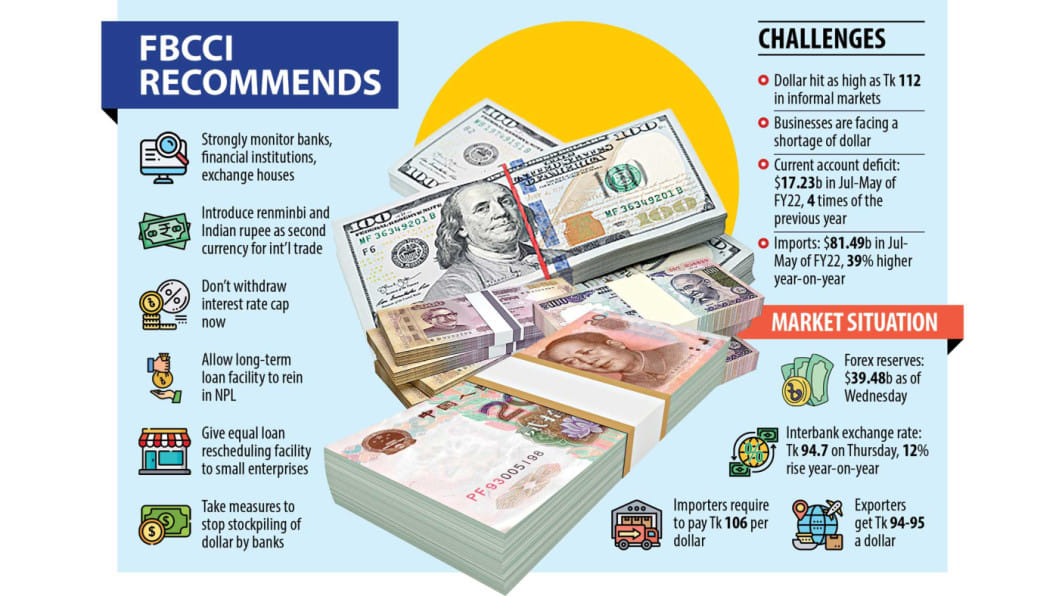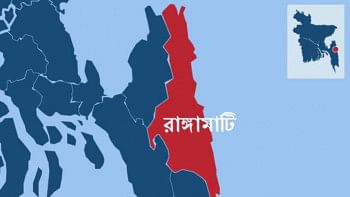Forex market volatility: FBCCI wants action against wrongdoers

The country's apex trade body yesterday called on the central bank to beef up its monitoring of private commercial banks, financial institutions and money changers to check the anomalies in the international currency exchange business.
The Federation of Bangladesh Chambers of Commerce and Industry (FBCCI) came up with the recommendations, alleging a number of private commercial banks and financial institutions as well as money exchange houses are making a brisk business cashing in on the US dollar shortage.
"A section of banks and financial institutions are doing abnormal business in the foreign exchange market by taking advantage of the current situation. But the situation has not worsened as much as banks are showing," FBCCI President Md Jashim Uddin told The Daily Star after a meeting with Bangladesh Bank Governor Abdur Rouf Talukder.
"The profit-mongering attitude of banks has reached such a level that they are doing whatever they want to do with the exchange rate as if there are no regulations in the country."
The foreign currency market has become volatile in Bangladesh as the foreign exchange reserves have fallen at a faster pace in recent months owing to accelerated import payments as the economy rebounds from the pandemic-induced slowdown.
On the interbank forex market, the exchange rate of the local currency stood at Tk 94.70 per USD yesterday in contrast to Tk 84.80 a year ago. This means the taka has lost a value of 11.67 per cent in the past one year.
On July 25, the BB depreciated the value of the taka by 25 paisa as the demand for the US dollar shows no sign of slowing down. But banks don't follow the rate while buying and selling the American greenback since demand outweighs supply.
Exporters complain that local banks are paying them Tk 93–94 a dollar when they encash export proceeds, whereas importers say they are now counting Tk 105-106 to purchase each dollar.
The FBCCI president urged the central bank governor to bring money changers under strong monitoring since they are also making an abnormal profit as well.
Speaking to The Daily Star, Jashim said the central bank should allow local businesses to use the Chinese renminbi (RMB) to settle international trade transactions.
"The RMB could be an option for Bangladesh in this difficult situation. If the currency is used, the pressure on US dollars will ease significantly. We need to lessen the pressure on US dollars to save our businesses and the economy."
Even, Bangladesh can use the Indian rupee to tackle the exchange rate volatility between the taka and the US dollar, the FBCCI chief also said.
China is the largest trading partner of Bangladesh and the largest source of imports. India is also a major trading partner of the country. They together accounted for 42 per cent of Bangladesh's imports in the fiscal year of 2020-21, BB data showed.
Md Saiful Islam, president of the Metropolitan Chamber of Commerce and Industry, met with the central bank governor on Wednesday and suggested allowing international trade transactions in the RMB.
"We need to cut our over-reliance on the single currency. The use of multi-currency in trading may ease the pressure on dollar dollars," he said yesterday.
Nearly 90 per cent of Bangladesh's international trade takes place in US dollars.
Islam also said Bangladesh can use the Indian rupee for international trade.
The FBCCI suggested the governor extend a similar loan rescheduling facility to small and medium enterprises like that given to large borrowers since they are a major part of the economy and contribute to the nation.
On July 18, the central bank allowed an unprecedented loan rescheduling facility, mostly for big business houses.
The central bank should introduce a long-term loan facility for borrowers to reduce the amount of non-performing loans (NPLs), Jashim said.
He reasoned that many companies take up loans from banks but they can't formally start operations because of a delay caused by various official procedures.
"But the interest rate on the loans keeps accumulating, and finally the loan becomes NPL," he said.
NPLs totalled Tk 113,441 crore in March this year, just off the record high of Tk 116,288 crore hit in September 2019, central bank data showed.
Jashim urged the central bank not to withdraw the interest rate cap on loans at this moment.
A number of economists have urged the central bank to lift the ceiling to rein in the credit supply with a view to tame inflation, which surged to a nine-year high of 7.56 per cent in June.

 For all latest news, follow The Daily Star's Google News channel.
For all latest news, follow The Daily Star's Google News channel. 



Comments